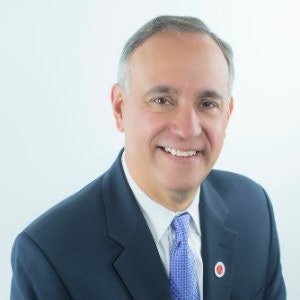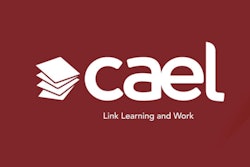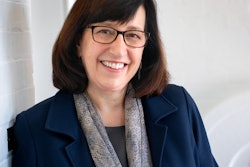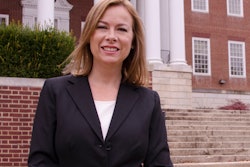“Aaron Tenenbaum. Allen Y. Lew. Angel Torres. Anita Crumpton.”
These are the first four names at the top of the City University of New York’s (CUNY’s) “In Memoriam” webpage. They lead two long columns of faculty, staff, and students, all in the CUNY system, who died of COVID-19.
The online memorial project started in May 2020, when New York City was still the epicenter of the infection. Creating a website to memorialize the dead felt a little strange, said Dr. Félix V. Matos Rodríguez, CUNY’s chancellor. “It isn’t the way we’ve learned to grieve.”
 Dr. Félix V. Matos Rodríguez
Dr. Félix V. Matos RodríguezHe did not anticipate the overwhelming, positive responses he would receive from the CUNY community.
“It’s been touching, humbling, to see how much of an outlet it became,” he said. CUNY is one of the only higher education institutions to create a public, online memorial for those they lost to the pandemic.
By CUNY’s count, to date, they have lost 21 staff members, 18 faculty, and nine active students to COVID-19. They are not alone; across the nation, thousands of higher education staff, faculty, students, alumni, and community members are coping with loss.
An online memorial may not be the right way for everyone to grieve. Some cultures observe death in a private way. But what’s most important, according to grief and bereavement expert Dr. David Schonfeld, is that institutions listen to the concerns and needs of their students, faculty, and staff and acknowledge these deaths in some way.
Schonfeld is the director of the National Center for School Crisis and Bereavement (NCSCB) at Children’s Hospital Los Angeles and a founding member of the Coalition to Support Grieving Students. Since 1990, he has helped institutions and communities process their grief, from 9/11, to hurricanes, to mass shootings. Helping students, faculty, and staff grieve through a pandemic does create its own “unique challenges,” Schonfeld added.
Grief, said Schonfeld, is an isolating experience, which isn’t helped by further isolation in quarantine, or feeling like social situations put individuals at risk for transmission. COVID-19 has created a “phenomenon of cumulative loss,” said Schonfeld, particularly in communities that lost thousands to the virus, like the Native American population. Centers of Disease Control data shows that Native American/Alaskan Natives who contracted COVID-19 died at two and a half times the rate of White or Asian persons.
Dr. Charles M. Roessel, president of Diné College in Tsaile, Arizona, heard stories from student after student, sharing the hardships they were going through. “So many family members were sick or dying,” he said, voice catching. “It was horrific.”
In December 2020, Dr. Herbert Benally died from the virus. Roessel called Benally “instrumental to the early days of” Diné College. Benally was a professor of language and cultural studies, and his research was centered around de-colonizing indigenous healing.
 Dr. Herbert Benally
Dr. Herbert BenallyRoessel felt it would be helpful for the whole community, not just Native residents, to understand Navajo methods of coping. Diné College created virtual educational seminars called “Using Navajo Traditions to Fight COVID-19.”
“Navajos are used to having to deal with adversity, to deal with something being thrust upon us. And I think knowing that your culture has survived everything in the past … there’s not comfort in that, but there’s reassurance in that,” he said.
Roessel tried to let his students guide his response to the pandemic. Some asked if they could create a drum circle group on Zoom to sing. Some students, he said, wanted to engage with Western counseling, so he made sure to provide different kinds of support. But he said he wished that they, as a college, had focused more on supporting the grieving process from the beginning.
“In the early days, it was more about safety, conversion of our programs online,” said Roessel. “After all that, we looked around and said, ‘we’re missing something.’”
Addressing grief is not a skill many Americans are trained in, Schonfeld said, but he encourages institutions, staff, and faculty, to talk to students and make changes that can accommodate their grief.
“We’re better as a society at being informed about trauma, but we don’t do a good job at being grief-sensitive,” he said. “The reality of losing someone you love, it’s difficult. While it’s a reality for everyone, it doesn’t make it easy. It’s really very hard.”
He added: “There’s a tendency in the U.S. to talk about grieving as a nation, shared grief. I think grief is a personal experience,” adding that institutions must create the “culture of support” needed to get students, faculty, and staff through their individual grief.
Maryann McKenzie, deputy to CUNY’s dean of recruitment and diversity, was tasked with taking on their memorial website project. She and roughly a dozen other stakeholders aimed to construct their project with great sensitivity, confirming with each person’s family that it was alright to share the loss online before adding their name, obituary, picture, or other information to the page.
Building the site “was real a demonstration of love,” said McKenzie, even if that labor took a personal toll. CUNY’s human resource personnel helped guide the group as they engaged with difficult work, instructing them through “self-care” with gravity balanced by humor. It was necessary as the list of names on their site kept growing.
“We are still — I say we collectively — we’ll be managing the fallout of this [virus] for some time to come,” said McKenzie.
For Rodríguez, the CUNY online memorial has been helpful as he grieves not only the loss of his CUNY family at large but the loss of one of his personal friends, Allen Lew. Rodríguez said Lew, a CUNY alum, had joined his team only recently before COVID hit. Lew was senior vice chancellor for the Office of Facilities, Planning and Construction Management. He died on June 23, 2020.
“The virtual space can live on,” said Rodríguez. “I feel very proud in terms of feeling it’s the right way to celebrate so many of those wonderful people that we tragically lost.”
Liann Herder can be reached at [email protected].
















